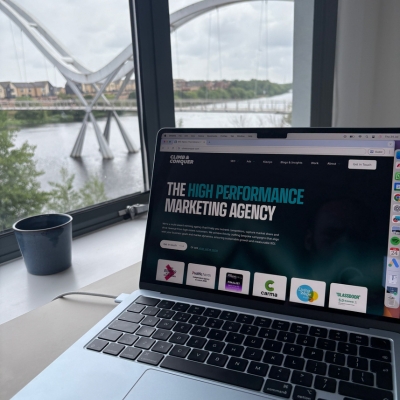Quick Navigation:
- What is Real Estate SEO?
- What Should You Be Focusing On?
- Struggling to Get More Leads? Let Us Do the Heavy Lifting
If you’re looking for some SEO tips for real estate agents, you’re in the right place. Being a top estate agent means nothing if buyers and sellers can’t find you online. With 97% of home buyers starting their search on Google, a strong SEO strategy is essential to stay ahead of the competition.
So, how do you rank higher, attract serious clients, and turn website traffic into leads? Our guide covers:
- The best SEO strategies for estate agents to dominate search rankings.
- Local SEO tips to get your agency featured in Google’s Map Pack.
- How to optimise property listings for maximum visibility.
Need expert help? Discover how an expert SEO agency like Climb & Conquer can help your estate agency rank higher with our real estate SEO services.
What is Real Estate SEO?
Real estate SEO is the process of optimising your website so that when people search for properties, estate agents, or real estate services, your business appears at the top of Google’s search results.
Why is SEO Important for Estate Agents?
Think about how home buyers and sellers find real estate services today. They don’t just walk into an office – they Google it first. Whether they’re searching for:
- “Homes for sale in [your area]”
- “Best estate agents near me”
- “How to sell my house quickly”
They’re looking for answers, and the estate agents who rank highest in search results are the ones they’ll contact first.
For example, a study showed websites that were the top listing on Google receive (on average, of course) 39.8% of the traffic, and 18.7% for websites that rank in second place.
SEO = More Website Visitors -> More Leads -> More Sales
- Higher search rankings = more website traffic.
- More traffic = more potential buyers and sellers.
- More leads = more deals closed.
If your website isn’t optimised for search engines, you’re handing leads to your competitors – and everyone knows that in real estate, every lead counts.
What Should You Be Focusing On? Our SEO Tips For Real Estate Agents
Not all SEO strategies are created equal, and as a real estate agent, knowing where to focus your efforts is key. SEO for estate agents involves multiple approaches, but some have a much bigger impact on rankings and lead generation than others. Below, we’ll break down the most important SEO tips for real estate agents:
1) Local SEO
When people search for estate agents, they often look for services near them. That’s why Local SEO is one of the most important aspects of real estate SEO. Google prioritises local businesses, meaning agents who optimise their Google My Business Profile will rank higher than those who don’t. One of the most important parts of local SEO is reviews, after all – you always click on the company with the best reviews, right?
In short, here’s how to optimise your local SEO:
- Google Business Profile Optimisation – Make sure your business listing is fully completed with accurate contact details, high-quality images, and up-to-date business hours.
- Online Reviews & Reputation Management – Reviews play a massive role in rankings and conversions. The more positive reviews you have, the more likely you are to appear in the top three search results (also called the “Local Pack”). Encourage happy clients to leave reviews and always respond to feedback.
- Consistent Business Information – Your business information should be consistent across all online directories (Google, Yelp, Rightmove, Zoopla, etc.). Inconsistent business details can confuse Google and potentially hurt your rankings.
- Location-Specific Pages & Content – If you operate in multiple areas, create dedicated landing pages and a unique Google My Business Profile for each location. These pages should be unique and not just duplicate versions of each other with different city names swapped in.
How to Optimise Your Google Business Profile
- Claim & Verify Your Listing – Go to Google Business Profile Manager and ensure you’ve claimed your estate agency.
- Use the Right Categories – Your primary category should be “Real Estate Agency”, but also add “Real Estate Consultant” and “Property Management Company” if applicable.
- Post Weekly Updates – Regular Google Business Profile posts (market updates, new listings, buyer/seller tips) can help improve local rankings.
2) Technical SEO
It doesn’t matter how great your content is if your website is slow, broken, or difficult to use. Technical SEO focuses on optimising your website’s backend so it loads quickly, works smoothly on all devices, and is easy for search engines to crawl and index.
Here are the key technical areas you should focus on:
- Mobile Friendliness – A mobile-friendly, responsive website is non-negotiable, especially since 59% of property searches happen on mobile devices.
- Page Speed & Performance – A slow website kills conversions. According to Google, If a page takes longer than 3 seconds to load, 53% of visitors will leave before they even see your listings. Google PageSpeed Insights is an excellent tool for identifying and fixing speed issues.
- Website Structure & Internal Linking – A well-structured website makes it easier for search engines and users to find information. Your homepage should link to category pages, and those category pages should link to specific property listings or service pages.
- Fixing Broken Links & Errors – 404 errors, broken pages, and incorrect redirects can frustrate users and waste Google’s crawl budget. Regularly review your site using tools like Google Search Console and fix any technical issues.
- Schema Markup for Real Estate Listings – Structured data (also called schema markup) helps Google understand your content better. Adding real estate schema (such as property type, price, location, and availability) and review schema can be the difference between someone clicking on you over a competitor.
How to Fix a Slow Real Estate Website
- Run a Speed Test – Use Google PageSpeed Insights to identify slow-loading pages.
- Compress Property Images – Large images slow down real estate websites. Use TinyPNG or Imagify to reduce file sizes.
- Enable Lazy Loading for Listings – This ensures images only load when they’re visible on-screen, speeding up page loads. Use a WordPress plugin like WP Rocket for easy setup.
- Fix Broken Pages & Redirects – Use Google Search Console to find 404 errors, then use 301 redirects to guide users to active listings.
Pro Tip: If your site runs on WordPress, use WP Fastest Cache for better performance.
3) On-Page SEO
On-page SEO is about making sure search engines can understand and rank your pages properly. Each property listing, service page, and blog post needs to be completely optimised for the user. People often get caught up in “Optimising for SEO”, but the most important thing is creating useful and reliable content.
Of course, optimising your title tag (probably the 2nd most important thing behind useful content) and other on-page stuff is important too, but Google’s main goal is to “present helpful, reliable information that’s primarily created to benefit people, not to gain search engine rankings” – so you should always prioritise that first.
Here are the most important parts of on-page SEO for estate agents:
- Title Tags & Meta Descriptions – These are the first things people see in search results. Use compelling titles with clear keywords (e.g., “Luxury Apartments for Sale in London – Expert Estate Agents”).
- Header Tags & Content Formatting – Proper use of H1, H2, and H3 tags helps structure your content and improves readability.
- Use Location-Specific Keywords – Instead of generic terms like “2-bed apartment,” optimise for “2-bed apartment for sale in [City]”.
- Optimising Property Listings – Each listing should have a unique and detailed description (not just copy-pasted from Rightmove or Zoopla). Instead of stuffing keywords, write naturally with key details:
❌ Bad Example: “This house for sale is a great house in London. If you want a house in London, this house is for you.”
✅ Good Example: “A stunning 3-bed home in Clapham, featuring a spacious garden and modern interiors, perfect for families looking for a peaceful residential area.”
- Image SEO – Every property image should have an alt tag describing the image (e.g., “Spacious 3-bedroom home with garden in Bristol”).
- Internal Linking – Linking to related blog posts, area guides, or other property pages keeps visitors on your site longer and improves SEO.
4) Content Creation
People don’t just search for estate agents – they also search for advice. That’s where content creation comes in. Regularly publishing helpful, high-quality content builds trust with potential buyers and sellers while also boosting your site’s search rankings.
For example, imagine a potential home buyer searching for “how to get a mortgage” or “best areas to live in [city]”. If your blog provides in-depth, useful answers to these questions, they’re more likely to see you as a trusted expert – and potentially reach out when they’re ready to buy or sell.
Some of the best types of real estate content include:
- Market updates that keep buyers and sellers informed on housing trends.
- Neighbourhood guides that help potential buyers choose the right area.
- Step-by-step property buying and selling guides to simplify the process for clients.
- Video content, such as virtual property tours.
Remember: the more valuable content you provide, the more likely potential clients are to find and trust your brand.
Struggling to Get More Leads? Let Us Do the Heavy Lifting
Real estate SEO isn’t just about ranking higher – it’s about getting more leads, more enquiries, and more sales – the metrics that will actually allow your business to grow.
We don’t believe in empty promises – we believe in results.
🚀 97.46% client retention rate – because we deliver real, measurable growth.
📈 608.74% increase in organic traffic – on average, within 12 months.
💰 2758% growth in organic revenue – without increasing ad spend.
And that’s just the beginning. Whether you’re a small local estate agency or a national property brand, we are an SEO agency that creates data-driven, high-impact SEO strategies tailored to your business and audience. No long contracts – just real results.
Want to dominate the real estate market? Book a Free SEO Audit & Strategy Session
OR
Learn more about our other SEO Services




